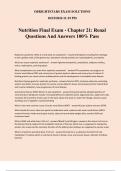©BRIGHTSTARS EXAM SOLUTIONS
10/23/2024 11:19 PM
Nutrition Final Exam - Chapter 21: Renal
Questions And Answers 100% Pass
Nephrotic syndrome; What is it and what are symptoms? - answer✔Symptoms resulting from damage
to the capillary walls of the glomerulus; Symptoms include proteinuria, hyperlipidemia, and edema
What can cause nephrotic syndrome? - answer✔glomerulonephritis, amyloidosis, diabetes mellitus,
toxins, medications, and drug abuse
What complications can arise from nephrotic syndrome? - answer✔The syndrome can progress to
chronic renal failure (CRF) and urinary loss of protein leads to edema and urinary loss of vitamin D
binding protein can cause calcium malabsorption and the development of metabolic bone disease
Nutrition therapy goals for nephrotic syndrome - answer✔control HTN, minimize edema by restricting
sodium and fluids, increase protein to counter urinary albumin losses and prevent protein malnutrition
and muscle catabolism, slow progression of renal disease
Acute Renal Failure (ARF); What it is and symptoms - answer✔characterized by abrupt/rapid loss of
renal function; Symptoms include: increased BUN and creatinine levels, oliguria/anuria, rapid heart rate,
excessive thirst and dry mouth, pain in the back, above the waist or under the ribcage, dizziness upon
standing, loss of appetite, nausea/vomiting
What is the most common cause of acute renal failure (ARF)? - answer✔acute tubular necrosis (ATN)
What should the nurse take into special consideration with a patient with acute renal failure (ARF)? -
answer✔monitor intake and output closely, take and record body weight daily, monitor BUN and
creatinine levels
What is BUN and what does it tell us? - answer✔Blood Urea Nitrogen; measures the amount of urea in
the blood; Directly related to the metabolic function of the liver (since liver is supposed to metabolize
protein into urea) and the excretory function of the kidney (since kidneys are supposed to excrete urea)
What is Creatinine and what does it tell us? - answer✔Creatinine is a substance formed from the
metabolism f creatine which is commonly found in blood, urine, and muscle tissue; Indicator of kidney
function
, ©BRIGHTSTARS EXAM SOLUTIONS
10/23/2024 11:19 PM
What kind of consequences (issues) can result from after a renal transplantation - answer✔weight gain,
hyperlipidemia, hyperglycemia, HTN, altered bone health
What is seen in the oliguric/anuric phaseof ARF? - answer✔Great reduction in GFR --> less pee is being
made and not enough things are getting filtered out --> accumulate in the body; Increased BUN and
Creatinine; Electrolyte abnormalities (hyperkalemia, hyperphosphatemia, azotemia); HTN, acidosis,
anorexia
What is azotemia? - answer✔elevated blood urea nitrogen (BUN) = abnormally high levels of nitrogen-
containing compounds, such as urea, creatinine, and various body waste compounds
Nutritional Therapy for after a renal transplantation - answer✔High kcal because of stress of surgery and
immunosuppressive drugs and restriction of glucose if drugs are causing increased blood glucose levels
What is usually seen in patients in the diuretic phase of ARF? - answer✔An increase in GFR --> high urine
output; BUT renal cells cannot concentrate urine (they're working but not very efficiently) so body is
losing lots of fluid --> watch electrolytes and dehydration/maybe IV
Amyloidosis - answer✔Amyloids are fibrous proteins that accumulates in various organs; Usually
produced by cells in the bone marrow and can be deposited in any tissue
- Can be the cause of nephrotic syndrome
What is seen during the recovery phase of ARF? - answer✔Kidney function gradually improves, edema
decreases, renal tubules begin to function adequately, fluid and electrolyte balance are restored, GFR
has usually returned to almost normal; May be some residual permanent damage, BUN/Creatinine may
never return to normal levels
Nutrition Therapy goals for oliguric/anuric phase of Acute Renal Failure (ARF) - answer✔sodium, fluid,
potassium, restriction if client is retaining these; Limit protein to minimize azotemia if client is retaining
nitrogen
Nutritional therapy goals for diuretic phase of ARF or if patient is on dialysis with ARF - answer✔Since
sodium and potassium may be lost, these losses should be replaced as needed depending on urinary
volume, serum levels, and frequency of dialysis; Large amounts of fluid may be needed to replace losses
Chronic Renal Failure (CRF); What it is - answer✔slow, steady decline in renal function evaluated by the
GFR; result is progressive irreversible loss of kidney function progressing to Chronic Kidney Disease
(CKD)
What can cause Chronic Renal Failure (CRF)? - answer✔Most common causes are HTN and Type 2 DM;
Causes also include glomerulonephritis, obstructive diseases such as kidney stones and tumors,
congenital birth defects of kidneys and urinary tract, and illicit use of analgesics or street drugs




